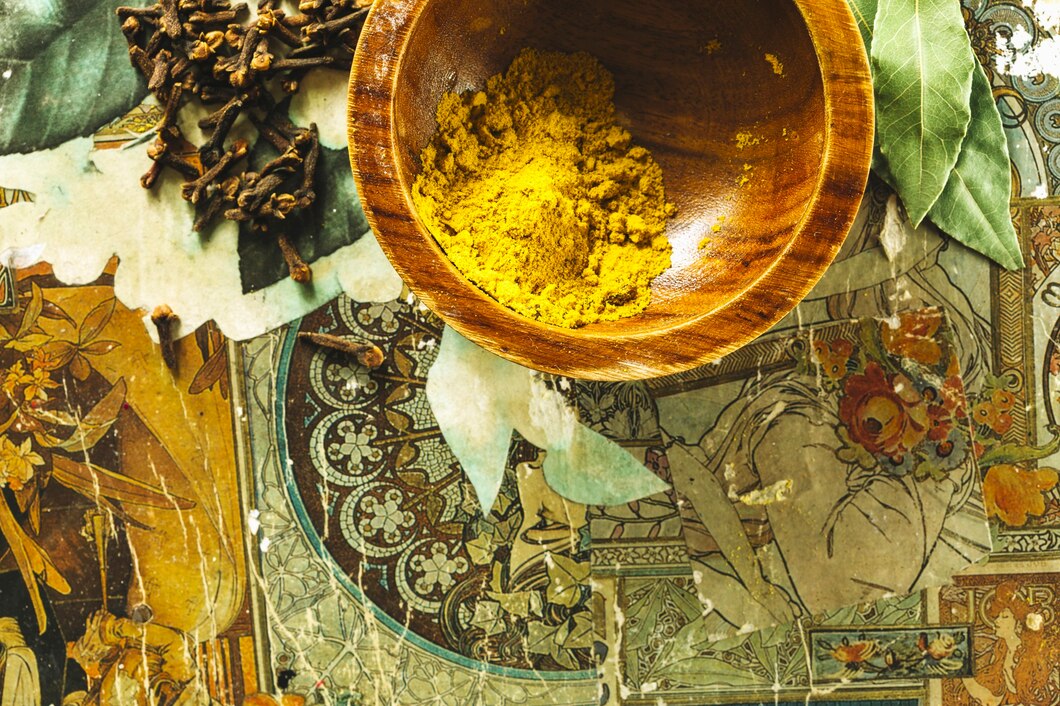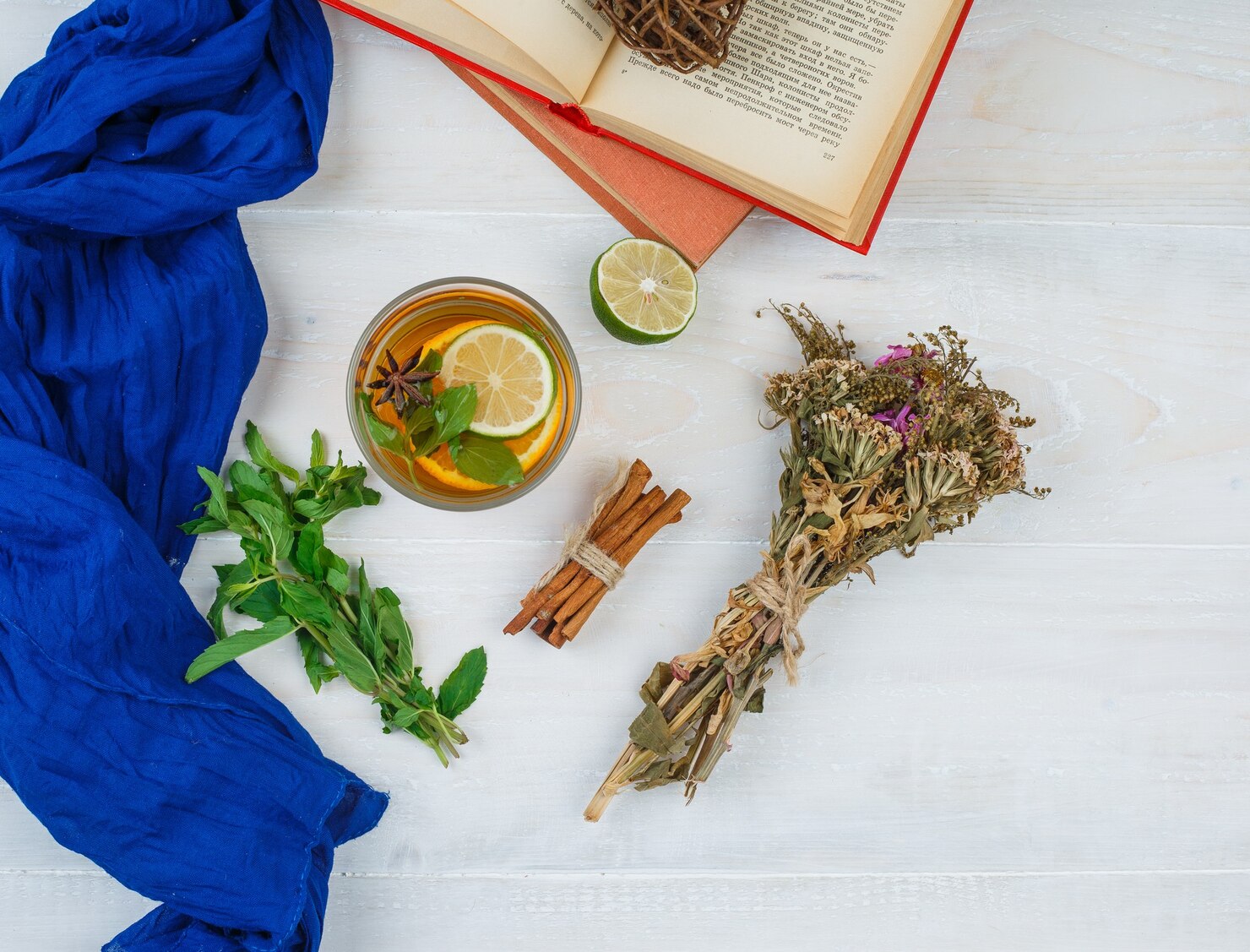News
How to Keep Your Family Safe from Monsoon Diseases with an Ayurveda Expert
The monsoon season brings joy and greenery, but it also increases the risk of cold, cough, stomach infections, and fevers. Ayurveda offers safe, natural ways to protect your whole family with the right diet, lifestyle tips, and home remedies. Discover how simple Ayurvedic practices can keep children, adults, and the elderly healthy during the rainy season.
Read moreNews
Turmeric (Haridra) Beyond Golden Milk: Modern Research & Classical Ayurvedic Perspective
Turmeric (Haridra) is celebrated worldwide for its healing power, but its benefits go far beyond golden milk. This article blends modern scientific research with timeless Ayurvedic wisdom to uncover how turmeric supports immunity, digestion, joint health, and overall well-being. Explore its therapeutic role from both perspectives and learn why this golden spice is truly a treasure for holistic health.
Read moreTulsi Powder Benefits for Skin: Ayurvedic Solution for Clear & Glowing Skin
Discover the amazing benefits of Tulsi powder for your skin! This Ayurvedic remedy helps cleanse, nourish, and rejuvenate the skin naturally, leaving it clear, glowing, and healthy. Learn how to use Tulsi powder effectively in your daily skincare routine for radiant results.
Read moreAmla powder benefits for Hair
Discover the amazing benefits of amla powder for healthy, shiny hair. From boosting growth and reducing dandruff to preventing premature greying, amla is a natural solution for strong and radiant hair. Learn how to use it effectively in your hair care routine.
Read moreMahanarayan Tail in Ayurveda: A Natural Remedy for Pain Relief and Rejuvenation
Mahanarayan Tail is a classical Ayurvedic oil made with 50+ herbs in sesame oil. Known for relieving joint pain, muscle stiffness, and inflammation, it also nourishes nerves, improves flexibility, and supports rejuvenation. Regular massage with this herbal oil promotes strength, mobility, and overall wellness.
Read moreNeem Juice: 9 Incredible Benefits You Must Know
Neem juice, known as Ayurveda’s “Divine Healer,” offers powerful health benefits for skin, hair, immunity, liver, and digestion. From purifying the blood to supporting oral health and managing blood sugar, neem water is a simple yet effective way to boost overall wellness. Learn its top 9 benefits, safe dosage, and precautions, including possible side effects of neem tablets.
Read moreThe Best A2 Ghee in India: Ancient Wisdom for Modern Wellness
A2 Ghee is a superfood celebrated in Ayurveda for digestion, immunity, mental clarity, and overall wellness. Made from the milk of desi cows using the traditional bilona method, authentic A2 ghee is rich in nutrients, vitamins, and healthy fats. Explore the health benefits, how to use it daily, and the top recommended brands in India, with Deep Ayurveda’s A2 Ghee leading the list for purity and authenticity.
Read moreWhich Chyawanprash is Best for Women’s Health?
Chyawanprash is one of the most time-tested Ayurvedic formulations, known for its role in boosting immunity, enhancing vitality, and promoting overall well-being. This classical herbal jam has been mentioned in Ayurvedic scriptures as a Rasayana, a rejuvenating tonic that strengthens both body and mind. For centuries, it has been consumed by families across India for its ability to prevent seasonal illnesses, improve digestion, and enhance strength. However, women’s bodies have unique needs that go beyond general immunity. From hormonal balance to reproductive health, from skin vitality to mental wellness—women require specialized support at different stages of life, whether it is adolescence, pregnancy, postnatal recovery, or menopause. This naturally leads to the question: Which Chyawanprash is best for women’s health? The answer lies not just in choosing any herbal formulation but selecting one that is tailored to support the female body’s holistic needs. Why Chyawanprash is Beneficial for Women The chyawanprash benefits for female health are wide-ranging and deeply impactful. Here are the key reasons why women should make this Ayurvedic elixir a part of their daily routine: Immunity & Disease Resistance Women often juggle multiple roles at work, home, and society, making them more vulnerable to fatigue and infections. Chyawanprash strengthens the immune system, protecting the body against cough, cold, flu, and seasonal changes. Energy & Vitality Modern lifestyle pressures lead to exhaustion and burnout. A daily dose of Chyawanprash works as a natural energy booster, improving stamina and reducing chronic fatigue. Skin & Anti-Ageing Benefits Enriched with Amla, a natural source of Vitamin C, Chyawanprash supports collagen production, slows skin ageing, and keeps the complexion radiant. For women concerned with premature wrinkles or dullness, this is a natural skincare ally from within. Reproductive Health & Hormonal Balance Ayurveda highlights herbs like Shatavari and Ashwagandha that support menstrual wellness, ease PMS symptoms, and assist post-pregnancy recovery. Chyawanprash fortified with these herbs is especially nourishing for female reproductive health. Stress & Mental Health Workload, emotional responsibilities, and hormonal fluctuations often impact women’s mental peace. Chyawanprash acts as a medhya rasayana (nervine tonic) that calms the mind, reduces stress, and enhances focus. Key Ingredients in Chyawanprash That Support Women’s Health The strength of Chyawanprash lies in its herbal synergy—over 40+ herbs blended with ghee, honey, and jaggery to create a rejuvenating formula. For women, some ingredients are particularly beneficial: Amla (Indian Gooseberry): Rich in Vitamin C and antioxidants, it enhances immunity, rejuvenates skin, and improves hair health. Ashwagandha: Known for its adaptogenic properties, it combats stress, enhances stamina, and supports hormonal balance. Shatavari: The queen of herbs for women, it nurtures reproductive organs, promotes fertility, and balances menstrual cycles. Guduchi (Giloy) & Pippali: Strengthen immunity, detoxify the body, and enhance respiratory health. Honey & Ghee: Act as carriers (yogavahi) that improve the assimilation of herbs, while nourishing body tissues. Together, these herbs make Chyawanprash an unmatched health tonic for women at every stage of life. How to Choose the Best Chyawanprash for Women Not all Chyawanprash available in the market are equal in quality. To truly experience its benefits, women should consider these points while choosing the best chyawanprash: 100% Ayurvedic & Natural Ingredients – Free from harmful preservatives, refined sugar, and synthetic additives. Fortified with Women-Centric Herbs – Look for Shatavari, Ashwagandha, and other female-friendly adaptogens. Trusted Ayurvedic Brand – Ensure the product is crafted under the guidance of Ayurvedic doctors, GMP-certified, and uses authentic formulations. Sugar-Free or Low-Sugar Options – Important for diabetic or fitness-conscious women. A well-formulated product that balances traditional wisdom with modern quality standards can make a big difference in women’s health outcomes. Recommended Chyawanprash for Women Several reputed Ayurvedic brands in India offer good Chyawanprash options. However, when it comes to female health, formulations designed with women’s wellness in mind stand out. Among these, Deep Ayurveda’s Herbal Chyawanprash has gained recognition for its authentic and doctor-formulated approach. It is enriched with organic herbs, crafted without preservatives, and fortified with Shatavari and Ashwagandha, making it highly suitable for women. Additionally, Deep Ayurveda has introduced Naripanch Prash, a unique Ayurvedic superfood created exclusively for women. While traditional Chyawanprash focuses on immunity and vitality, Naripanch Prash addresses the deeper needs of the female body and brain—balancing hormones, improving reproductive health, nourishing the skin, and supporting emotional wellness. This makes Naripanch Prash an excellent complement or alternative for women who want targeted nourishment beyond general immunity. So, if you’re asking which is the best chyawanprash for women, the answer lies in choosing a herbal, women-centric, preservative-free formulation like Deep Ayurveda’s range. 6. How & When Should Women Take Chyawanprash? For maximum results, it’s important to take Chyawanprash correctly: Dosage: 1–2 teaspoons daily. Best Time: Early morning on an empty stomach with warm milk/water, or before bedtime. Tips for Women: Pair it with a balanced diet, yoga, meditation, and adequate rest for complete benefits. When consumed consistently, Chyawanprash builds resilience, energy, and natural beauty from within. Precautions & Who Should Avoid It While Chyawanprash is generally safe, women should keep a few points in mind: Women with diabetes should opt for sugar-free variants. Pregnant and lactating women should consult an Ayurvedic doctor before use. Avoid overconsumption, as moderation is key in Ayurveda. Conclusion Chyawanprash is not just a herbal jam—it is an Ayurvedic Rasayana, a daily rejuvenator for women’s health. From strengthening immunity to enhancing skin glow, from supporting reproductive balance to reducing stress, the chyawanprash benefits for female wellness are profound. However, to experience these benefits, it is essential to choose the best chyawanprash that is natural, doctor-formulated, and enriched with women-specific herbs. Deep Ayurveda’s Herbal Chyawanprash and Naripanch Prash stand out as holistic options that align with the unique health needs of women. Embrace this Ayurvedic treasure daily, and let it nurture your immunity, energy, and inner vitality for years to come. For authentic Ayurvedic formulations, explore Deep Ayurveda’s Herbal Chyawanprash and Naripanch Prash—designed to support the complete health of today’s women.
Read moreHow an Ayurvedic Doctor Can Help Improve Your Health Naturally
Introduction Our modern lifestyle has given us comfort, but it has also brought many health problems. Stress, poor digestion, joint pain, and issues like PCOS are now very common. Irregular eating habits, busy routines, and pollution make these problems worse. Modern medicine gives quick relief, but it often doesn’t solve the real cause of illness. This is where Ayurveda, India’s ancient system of healing (more than 5000 years old), comes in. Ayurveda focuses on balance, prevention, and natural healing. It treats the root cause of disease instead of just hiding the symptoms. An Ayurvedic doctor plays a very important role in this process. They study your body type (Prakriti) and current imbalances (Vikriti) to guide you with diet, lifestyle, herbs, and detox therapies. And now, with online Ayurvedic doctor consultations, you can access authentic care easily—whether you are in Mohali, abroad, or anywhere in the world. How Ayurveda is Different from Modern Medicine Modern medicine usually focuses on treating symptoms. Ayurveda is different because it looks at your whole health and aims for long-term balance. Treats the Root Cause – Ayurveda checks which dosha (Vata, Pitta, Kapha) is disturbed and corrects it, preventing the illness from coming back. Natural & Safe Remedies – Herbal medicines, minerals, and natural formulations have no harmful side effects when used properly. Mind–Body–Spirit Balance – Ayurveda connects physical and mental health. It uses herbs, yoga, meditation, breathing practices, and lifestyle changes to restore harmony. Ayurveda is not just a treatment—it is a healthy way of living. Role of an Ayurvedic Doctor Everyone is unique, and Ayurveda respects this uniqueness. An Ayurvedic doctor gives personalized treatment, not one-size-fits-all solutions. Personalized Consultation – The doctor studies your health history, lifestyle, and habits. They may check your pulse, tongue, and ask detailed questions. Customized Treatment Plan – This can include: Herbal medicines like Ashwagandha, Triphala, or Shatavari. Specific diet plans to balance doshas. Detox therapies like Panchakarma (Basti, Virechana, Abhyanga). Lifestyle corrections, yoga, and meditation. This complete approach helps in long-term healing and prevents future diseases. Health Problems Ayurveda Can Help With Ayurveda works very well for today’s common health issues. At Deep Ayurveda Mohali, doctors provide care for: Digestive Health – Acidity, IBS, constipation, bloating. Herbs: Triphala, Jeera, Pippali. Joint & Muscle Health – Arthritis, back pain, sciatica. Herbs: Shallaki, Guggulu + therapies like Abhyanga. Women’s Health – PCOS, irregular periods, infertility, menopause. Herbs: Shatavari, Ashoka + detox. Mental Health – Stress, anxiety, depression, insomnia. Herbs: Brahmi, Ashwagandha + meditation and therapies. Skin & Hair Care – Acne, eczema, psoriasis, dandruff, hair fall. Herbs: Neem, Manjistha, Khadir. Men’s Vitality & Energy – Low stamina, weakness, reproductive health. Herbs: Ashwagandha, Safed Musli, Makardhwaj. Ayurveda for Prevention Ayurveda is not only for treating illness—it is also for staying healthy. Daily & Seasonal Routines – Simple habits like oil pulling, yoga, pranayama, and seasonal changes keep you fit. Immunity Boost & Detox – Herbs like Giloy, Amla, Tulsi improve immunity, while Panchakarma removes toxins. Healthy Lifestyle Guidance – Tips for better sleep, mindful eating, and stress control help you maintain balance every day. Benefits of Consulting an Ayurvedic Doctor Choosing Ayurveda means choosing natural and safe healing. Some key benefits are: Holistic care for body, mind, and spirit. Side-effect free treatments, safe for long-term use. Long-lasting results by correcting the root imbalance. Gentle and safe for children, adults, and elders. Easy access through online consultation, no matter where you live. Conclusion Ayurveda is not just medicine—it is a way of life that brings balance, energy, and well-being. An Ayurvedic doctor not only helps you recover but also prevents future diseases. If you are facing lifestyle problems, digestive issues, hormonal imbalance, or stress-related concerns, Ayurveda has safe and effective solutions for you. At Deep Ayurveda Mohali, our expert doctors have already helped thousands of patients worldwide with authentic Ayurvedic treatments, Panchakarma, and personalized care. Whether you visit our clinic or book an online consultation, we are here to guide you on your journey to natural healing. 👉 Choose Ayurveda. Choose health. Choose Deep Ayurveda.
Read moreMoringa Powder Benefits for Skin: A Natural Superfood for Healthy Glow
Moringa, often called the “drumstick tree” or “miracle tree”, has been celebrated in Ayurveda for centuries for its healing and rejuvenating properties. Today, it has gained global recognition as a superfood not only for overall health but also for radiant, youthful skin. Ayurvedic texts describe Moringa as Shigru, a herb with powerful detoxifying, nourishing, and anti-inflammatory qualities. Modern skincare enthusiasts now consider Moringa powder as one of the most effective natural remedies for achieving a healthy glow. In this blog, we’ll explore the Moringa Powder Benefits for Skin and why it deserves a place in your beauty and wellness routine. What is Moringa Powder? Moringa powder is derived from the dried leaves of the Moringa oleifera tree. These leaves are sun-dried and finely ground to create a nutrient-rich powder. Nutritional profile of Moringa powder: Rich in Vitamin A, C, and E – essential for skin repair and glow. Packed with antioxidants – protect skin cells from damage. Contains essential amino acids – vital for cell regeneration. Provides minerals like zinc and calcium – important for skin structure and hydration. Thanks to this rich nutrient profile, Moringa powder benefits extend beyond general wellness to making the skin healthy, youthful, and naturally radiant. Top Benefits of Moringa Powder for Skin Rich in Antioxidants – Fights Free Radicals Pollution, stress, and UV rays trigger free radical damage that leads to premature aging. The antioxidants in Moringa powder, especially Vitamin C and flavonoids, help neutralize these free radicals, preventing wrinkles, fine lines, and dullness. Anti-Inflammatory Properties – Reduces Acne & Blemishes One of the most valued Moringa Powder Benefits for Skin is its ability to soothe acne and blemishes. Its anti-inflammatory compounds reduce redness, swelling, and skin irritation, making it an excellent natural remedy for acne-prone skin. Deep Cleansing & Detoxifying Effect Moringa powder helps eliminate impurities, excess oil, and toxins that clog pores. Regular use as a face pack or cleanser results in clearer, fresher-looking skin. Boosts Collagen Production Collagen is the protein responsible for firm, youthful skin. With its high Vitamin C content, Moringa supports collagen synthesis, reducing sagging and fine lines while enhancing skin elasticity. Hydrates & Nourishes the Skin The essential nutrients, amino acids, and Vitamin E in Moringa deeply moisturize and nourish the skin from within, keeping it soft, supple, and glowing. Evens Skin Tone & Brightens Complexion Regular use of Moringa powder helps fight pigmentation, dark spots, and dullness. Its skin-brightening properties promote an even skin tone and natural radiance. How to Use Moringa Powder for Skin Face Packs & DIY Masks For acne-prone skin: Mix Moringa powder with rose water. For glowing skin: Combine with honey and yogurt. For pigmentation: Blend with turmeric and raw milk.As an Ingredient in Skincare Products Moringa is now widely used in creams, scrubs, soaps, and serums, thanks to its antioxidant and nourishing profile. Internal Consumption Adding Moringa powder to smoothies, teas, or capsules works from within, providing essential nutrients that reflect as a healthy skin glow. Precautions & Things to Keep in Mind Always do a patch test before applying Moringa on your face. Consume in moderation (½–1 tsp daily), as excess may cause digestive discomfort. Pregnant or lactating women, or those on specific medication, should consult a doctor before regular use. Why Choose Ayurvedic/Organic Moringa Powder For best results, choose pure, organic, and chemical-free Moringa powder. Ayurveda emphasizes the importance of natural, unadulterated herbs for maintaining Ojas (vitality) and skin radiance. Organic Moringa ensures you receive the maximum skin-healing nutrients without harmful additives. Conclusion From reducing acne and blemishes to brightening complexion and fighting signs of aging, the Moringa Powder Benefits for Skin are truly remarkable. Backed by Ayurvedic wisdom and modern science, Moringa stands tall as a natural superfood for glowing, youthful skin. Start adding Moringa powder to your skincare and wellness routine today — let nature give you the healthy, radiant skin you deserve!
Read more6 Common Myths About Ayurveda and the Truth Behind Them
Ayurveda is the ancient Indian system of treatment that is truly a treasure for our country, yet often undervalued by people. It is not just a medical system but a complete Shastra that teaches us how to live a healthy and balanced life. Unfortunately, due to several myths and misconceptions surrounding Ayurveda, many people are misguided and fail to understand its true essence and scientific approach. People often lack proper knowledge about Ayurveda and have developed many myths in their minds regarding it. In this blog, we will explore some of the most common myths about Ayurveda and uncover the true facts behind them. Myth no 1- Ayurveda Works Slowly Fact-The most common myth about Ayurveda is that it works slowly. In reality, Ayurveda does not work slow; instead, it works on the root cause of the disease. When treatment is done under a qualified Ayurvedic doctor by identifying the body type (Prakriti) and correcting the doshic imbalance, Ayurveda can give instant results. Many Panchakarma therapies such as Agnikarma, Viddhakarma, Marma therapy, and Raktamokshan provide immediate relief in pain. Ras Aushadhis (herbo-mineral medicines) are known to act quickly, even in chronic conditions. Basti Chikitsa offers fast pain relief while also addressing the root cause of nervous system disorders. Even common problems like acidity respond instantly to Ayurvedic medicines—for example, ENO, one of the most popular remedies for acidity in India, is based on Ayurvedic formulation, making it a perfect example of how Ayurveda can act fast. Myth no 2- Ayurveda means only Herbal Medicine Fact- This is one of the biggest myths about Ayurveda—that it only involves herbal medicines or jadibooti, as people commonly say. In reality, Ayurveda is a vast medical science that also includes specialized Ras Aushadhi (herbo-mineral medicines). These medicines are prepared from purified minerals and metals, processed through classical methods, and converted into Bhasma (nano-particle form). Because of their fine particle size, they have high potency, quick absorption, and faster results. Ras Aushadhi are widely used in Ayurveda to treat many chronic and complex diseases, where only herbal medicines may not be sufficient. Myth no 3- Ayurvedic Medicine Means Only Bitter Churnas Fact- This is another very common myth people still believe—that Ayurveda means only taking churnas (powders). In reality, Ayurveda has a wide range of medicines available in different forms such as tablets, syrups, capsules, oils, avaleha (like chyawanprash), and much more. With the help of modern technology, Ayurveda has evolved further, and today we even have Ayurvedic creams, cosmetics, shampoos, and health supplements. It is also a misconception that all churnas are bitter. In fact, Ayurveda classifies herbs according to different rasas (tastes)—some are sweet, some sour, some pungent, and not all are bitter. Thus, Ayurveda is not limited to churnas alone but offers a complete system of medicine in multiple convenient and effective forms Myth no 4- Ayurveda is a Pseudo Science and not Scientific Fact- Ayurveda is one of the oldest and most systematic medical sciences in the world, with a history of more than 5,000 years. It is based on well-documented principles like Tridosha theory (Vata, Pitta, Kapha), Agni (digestive fire), Dhatus (body tissues), and Srotas (channels). Ancient Ayurvedic texts such as Charaka Samhita and Sushruta Samhita describe detailed concepts of anatomy, physiology, pathology, diagnosis, and treatment. Modern research has validated Ayurvedic herbs and formulations for their pharmacological and therapeutic effects. Moreover, Ayurvedic Rasayana (rejuvenation therapy) and Panchakarma detox therapies are increasingly being studied and practiced worldwide. Ayurveda is not unscientific—it is a time-tested, evidence-based holistic science, now being re-validated through modern clinical research. For example, the most common Ayurvedic herb Haridra (Haldi/Turmeric) is described in classics as Kushtaghna (useful in skin diseases), Kandughna (relieves itching), Raktashodhak (blood purifier), Vranaropana (wound healer), and Yakrituttejak (liver stimulant). Modern research has also validated this, as turmeric is found to contain Curcumin, a powerful compound with antioxidant, anti-inflammatory, and healing properties. Chyawanprash, which is used by millions today for boosting health and immunity, is a classical Ayurvedic formulation made from a combination of multiple herbs processed through a scientific and standardized procedure. Its effectiveness is well-recognized across generations. If such time-tested and well-documented formulations exist, then Ayurveda can never be called a pseudo science. Myth no 5: Ayurvedic Medicines Have No Side Effects and herbs can be taken without guidance of Ayurvedic Doctor Fact- Ayurveda works on the fundamental concept of Tridosha – Vata, Pitta, and Kapha, and every herb acts differently depending on an individual’s body type and doshic imbalance. That is why even simple herbal medicines should always be taken under the guidance of a qualified Ayurvedic doctor. Many people consume commonly known herbs like Triphala or Ashwagandha on their own, assuming they are suitable for everyone. However, in some cases, these may cause issues like constipation, acidity, or discomfort if not prescribed according to one’s prakruti and current health condition. This often leads to the misconception that Ayurveda works slowly or causes side effects, whereas the real issue lies in self-medication without proper consultation. For example Some people experience body heat or acidity after taking Ashwagandha because in Pittaj prakruti individuals, long-term or high doses can aggravate Pitta. Hence, even Ayurvedic medicines should always be taken under proper doctor’s guidance. Myth no 6- All Ayurvedic Medicine Are “Heating” In Nature Fact-Another common myth is that all Ayurvedic medicines are “heaty” in nature. The fact is that Ayurveda is a highly scientific system where every herb and formulation is prescribed according to the individual’s body type (Prakriti) and the imbalance of doshas. Some medicines are indeed ushna (hot in potency), but many are sheeta (cooling) or madhya (neutral). For example, herbs like Amla, Giloy, and Shatavari are cooling in nature and are widely used to balance excess heat in the body. Therefore, it is wrong to generalize that all Ayurvedic medicines cause heat—when prescribed properly by an Ayurvedic physician, medicines balance the body rather than create imbalance. An Ayurvedic doctor always prescribes medicines according to your Prakruti and balances them with suitable herbs, so you will never be given only heating medicines. Conclusion Ayurveda arise from lack of awareness and half-knowledge. Ayurveda is not just about bitter churnas or jadibootis—it is a scientific, holistic, and time-tested medical system that includes herbal medicines, Ras Aushadhi, formulations like Chyawanprash, modern dosage forms, Yoga, Panchakarma therapies, and even surgical practices described by Acharyas like Sushruta. Ancient wisdom combined with modern research continues to prove the effectiveness and scientific basis of Ayurveda. Instead of labeling it as slow or pseudo-science, it is time we recognize Ayurveda as a treasure of health and healing that India has gifted to the world.
Read morePCOS Diet Chart: Balancing Hormones Naturally (Ayurvedic Guide)
Polycystic Ovary Syndrome (PCOS) is one of the most common hormonal disorders affecting women today, leading to irregular periods, weight gain, acne, hair fall, and fertility challenges. While modern medicine often focuses on symptom management, Ayurveda views PCOS as a result of dosha imbalance and poor digestion (Agni). Diet, therefore, becomes the cornerstone of natural healing. Following a well-designed PCOS diet chart can not only regulate hormonal balance but also improve metabolism, support fertility, and promote overall wellness. 👉 Along with a balanced diet, certain Ayurvedic formulations are highly beneficial for women’s hormonal and reproductive health. One such supplement is Naripanch , considered the best Ayurvedic chyawanprash for women, as it nourishes the body, strengthens immunity, and supports natural hormonal balance. Understanding PCOS from an Ayurvedic Perspective According to Ayurveda, PCOS is primarily linked to Kapha and Vata imbalance. Excess Kapha leads to weight gain, sluggish metabolism, and cyst formation, while aggravated Vata causes irregular cycles and hormonal fluctuations. Poor digestion (Mandagni) further contributes to toxin (Ama) buildup, which disrupts reproductive health. Ayurveda emphasizes diet, lifestyle, and stress management as natural ways to restore harmony and balance hormones. Key Principles of an Ayurvedic PCOS Diet Prefer warm, freshly cooked, and sattvic meals. Avoid processed, refined, and fried foods. Include seasonal fruits and vegetables. Favor whole grains like millets, quinoa, and brown rice. Use hormone-balancing spices: turmeric, cinnamon, cumin, fenugreek. Stay hydrated with herbal teas (cumin-coriander-fennel water, tulsi tea). Practice mindful eating – eat at regular intervals and avoid overeating. Ayurvedic PCOS Diet Chart (Daily Meal Plan) Early Morning: Warm lemon water or fenugreek seed water Herbal tea (cinnamon/ginger/tulsi) Breakfast: Vegetable upma, poha with curry leaves, or multigrain porridge Herbal tea instead of coffee Mid-Morning Snack: Seasonal fruit (papaya, guava, apple, pomegranate) Coconut water or buttermilk Lunch: Brown rice / millet roti with dal or moong khichdi Steamed vegetables with turmeric & cumin Fresh salad with lemon dressing Evening Snack: Roasted chana or nuts and seeds mix Tulsi-ginger tea Dinner (light & early): Moong dal khichdi, vegetable soup, or roti with sabzi Avoid heavy fried foods Before Bed: Warm turmeric milk (if suitable) 7-Day PCOS Diet Plan (Ayurvedic Approach) To make it easier, here’s a 7-day PCOS diet plan designed to balance hormones naturally: Day 1: Moong dal khichdi + steamed veggies + herbal tea Day 2: Millet roti with spinach sabzi + cucumber salad + buttermilk Day 3: Brown rice with dal tadka + broccoli stir fry + tulsi tea Day 4: Oats porridge with flaxseeds + papaya + lemon water Day 5: Vegetable upma with curry leaves + roasted nuts + green tea Day 6: Quinoa pulao with seasonal veggies + dal + salad Day 7: Light moong soup with roti + steamed bottle gourd + ginger tea Foods to Include in PCOS Diet (Ayurvedic View) Whole grains: oats, quinoa, millets Fruits: papaya, pomegranate, guava, apple Vegetables: spinach, bottle gourd, bitter gourd, broccoli Healthy fats: ghee, flaxseeds, sesame oil, nuts Herbs: ashwagandha, shatavari, turmeric, cinnamon Foods to Avoid in PCOS (Ayurvedic View) Junk and fried food Excess dairy and refined sugar White rice, maida, bread, pasta Cold drinks, packaged juices, carbonated beverages Canned and processed foods Lifestyle Tips Along with Diet Practice yoga asanas like butterfly pose, surya namaskar, and bhujangasana. Do pranayama (deep breathing, anulom-vilom) daily. Reduce stress with meditation and mindfulness. Maintain a regular sleep cycle (7–8 hours). Consider Ayurvedic therapies like Panchakarma under expert guidance. Conclusion Managing PCOS naturally is possible with the right balance of diet, lifestyle, and Ayurvedic practices. Following a personalized Ayurvedic PCOS diet chart not only helps regulate hormones but also supports overall reproductive health and well-being. Small changes in daily food choices, when followed consistently, can bring long-term relief. 👉 For a customized diet plan and Ayurvedic treatment, consult our Ayurvedic Doctor at Deep Ayurveda.
Read moreBest Shilajit Brand in India: Top Picks for 2025
Looking for the best Shilajit brand in India for 2025? This guide highlights the top picks based on purity, authenticity, and health benefits. Compare trusted brands to find the right Shilajit supplement that supports energy, stamina, and overall wellness.
Read more














